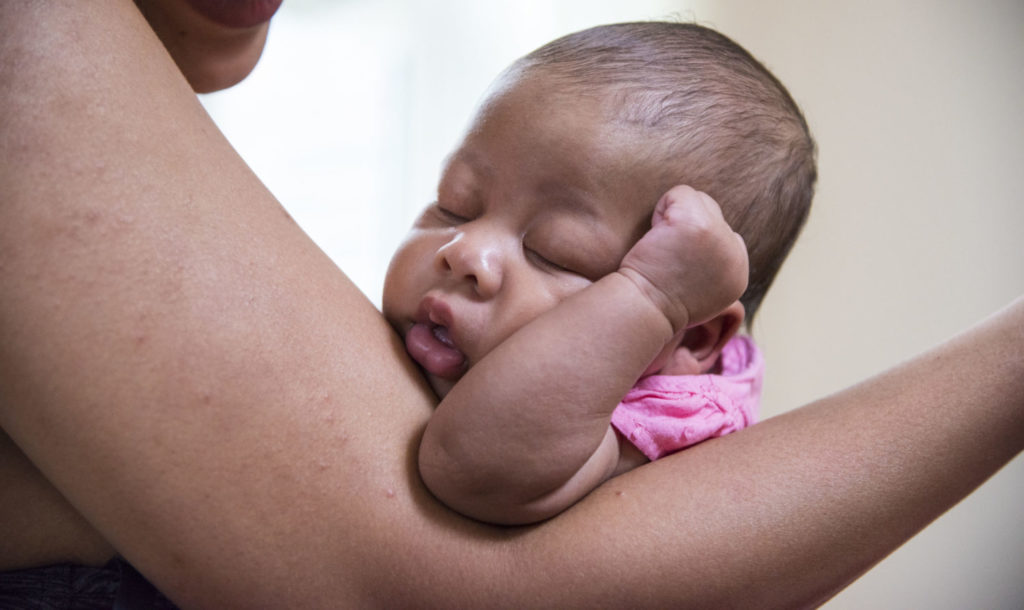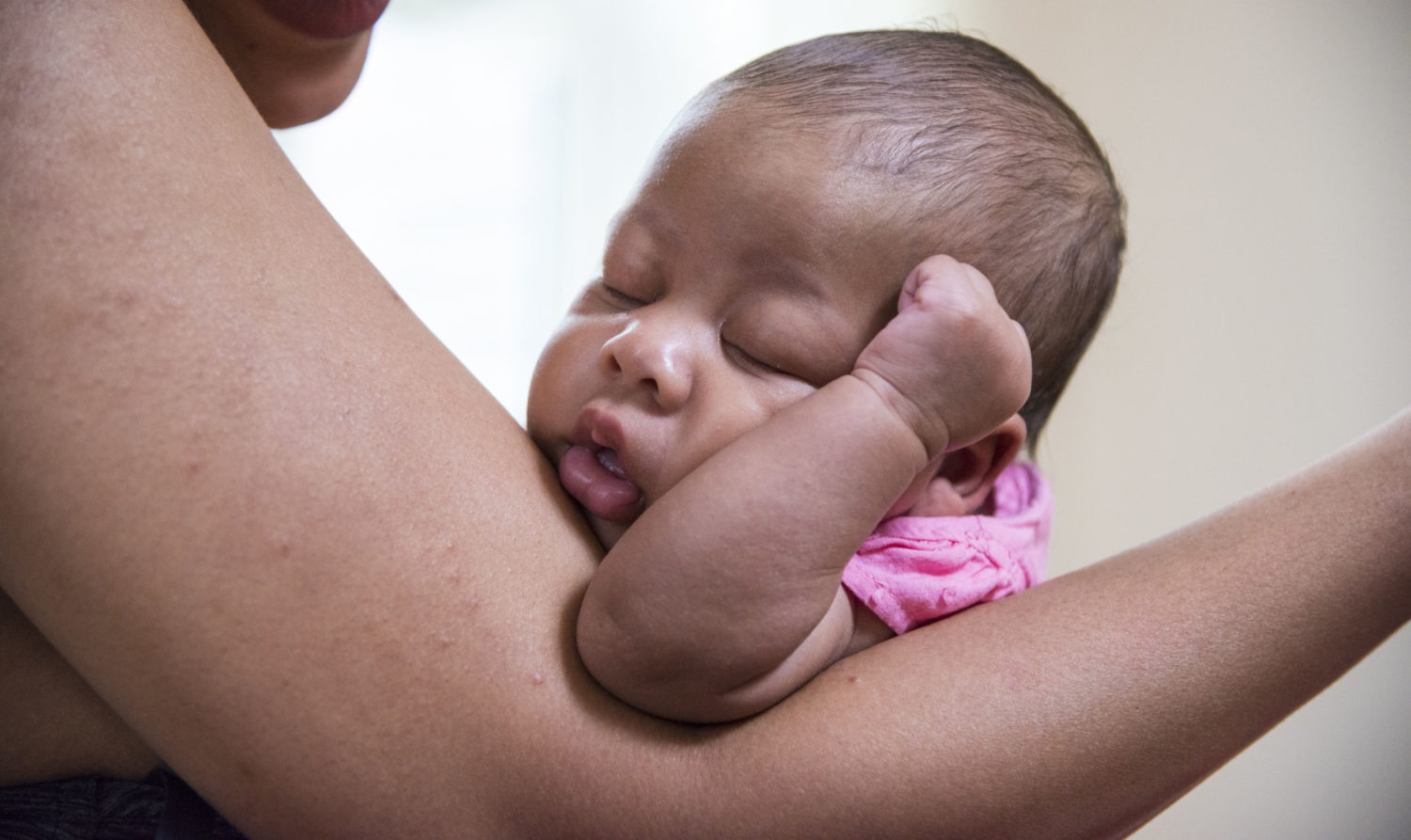

Because of the differences between infant and adult sleep patterns, it is normal for new parents to have questions about how infants learn to sleep through the night. The following guide provides information on how you can support your infant’s sleep needs.
How Much Sleep Does an Infant Need?
While every baby is different, there are general guidelines for infant sleep needs. Their sleep needs depend upon age ranging from birth to two years:
Birth to Three Months:
Newborn babies can sleep between 14-17 hours within a 24-hour period. This translates into about eight hours of daytime sleep (including naps) and up to eight hours of nighttime sleep. However, newborns do not tend to string these hours together into “long stretches” of uninterrupted sleep during this period. Instead, many newborns do not sleep more than one to two hours at a time. The best bet for new parents is to rest when the baby does and remain prepared for the newborn to wake several times at night for feedings.
Some newborns may prefer a little less sleep (11-13 hours within a 24-hour period) while others may need a bit more sleep (18-19 hours within a 24-hour period). Total sleep hours gradually decrease month by month. For example, the average one-month-old sleeps 15.5 hours, with eight to nine hours occurring at night and seven hours of sleep and naps during the daytime.
As their bodies adjust, there may also be a period when babies sleep more during the daylight hours than at night (a condition known as day-night reversal). This is perfectly normal, and most children soon adapt out of this stage.
Three to Six Months
At around three months old (or when babies weigh 12 to 13 pounds), many babies can start sleeping up to five hours at a time at night. While this can help parents adjust to their accustomed sleep schedules, keep in mind that three-month-old babies can still require up to 15 hours of sleep within a 24-hour period. This translates into four to five hours of sleep during the daytime and 9 to 10 hours of sleep at night (waking at least once or twice for feeding).
By six months, two-thirds of babies can sleep through the night on a regular basis. This means they can start getting around six to eight hours of uninterrupted nighttime sleep. Infants who are six months can still need around 14 hours of sleep total, with 10 hours occurring at night and four hours during the daytime in the form of naps.
Six Months to Nine Months
This is usually a happy transition period since babies begin to no longer require nighttime feedings and can begin to sleep comfortably through night hours. Parents can also use this time to catch up on sleep as well. By nine months old, babies can start getting up to 11 hours of nighttime sleep along with three hours of daytime sleep (divided into a couple of naps).
Nine Months to One Year
At this point, the majority of sleep occurs during nighttime hours. Children at this age begin to sleep through the night with an average of 11 hours of night sleep and 3 hours of daytime sleep.
One Year to Two Years
As night sleep becomes consistent, daytime sleep gradually decreases into recognizable childhood naps. For example, children get an average of 11 hours of nighttime sleep and 2.5 hours of daytime sleep once they reach 18 months old. By age two, children maintain the 11 hours of nighttime sleep but only need two hours of daytime sleep in the form of naps.
What are Signs of Infant Sleep Problems?
Infant sleep patterns differ greatly from adults (especially during the first few months). For example, babies spend much less time in rapid eye movement (REM) sleep (also known dreamtime sleep), and the sleep cycles are much shorter.
Even when babies begin to “sleep through the night” at around six months old, they may wake up every five hours or so due to separation anxiety. This is a normal part of human development as babies learn that sleep separations from parents are short-term and temporary (i.e. during nighttime hours). Even babies who do not experience separation anxiety may have difficulty falling asleep when they are overly tired or due to overstimulation.
Given these differences, it is understandable that some parents have difficulty identifying infant sleep problems. The following sleep problems are associated with common separation anxiety:
- Crying when a parent leaves the room
- Clinging to parent at separation
- Refusing to go to sleep without a parent nearby
In contrast, the following infant sleep problems may be signs of a health condition or illness for which you need to consult a pediatrician:
- Baby wakes up frequently during the night (even after reaching six months of age)
- Baby suddenly shows a new pattern of not going to sleep or staying asleep (after consistently sleeping through the night during previous months)
- Infant is not growing or gaining weight steadily
- Infant is not consuming normal feedings (recommended feeding is approximately eight to 12 times a day for a breastfed baby; five to 8 times a day for a bottle-fed baby or older infant)
- Baby is not urinating normally (at least four wet diapers daily)
- Baby does not have at least three bowel movements per day (it is also normal for breastfed babies to have bowel movements that are softer and more frequent)
Contact your healthcare provider if you have any concerns about unusual nighttime waking.
What are Signs That a Baby is ready to go to sleep?
It is often easier to get a child to sleep once you recognize sleep readiness. Comforting infants (such as with soothing, cuddling, or lullabies) when they are ready to sleep can also help them associate sleep with a positive experience. Some signs are your baby is ready to go to sleep include:
- Fussing
- Rubbing eyes
- Looking away (instead of normal playful eye contact)
- Yawning
How Can I Help My Baby Fall Asleep?
Since babies cannot necessarily control their own sleep patterns, it may take some practice and adjustments to create a routine that works for your family. Because not all babies know how to put themselves to sleep or know how to return to sleep after a nighttime waking, here are tips for helping your baby learn to sleep:
- Create a secure environment by cuddling and spending time with your baby during waking hours. This can help the infant feel more secure and reduce the risk of separation anxiety.
- Allow time for daytime naps as recommended for your child’s monthly age.
- Try morning walks. The exposure to sunlight and fresh air the morning can reset circadian rhythm after a sleepless night. This natural way of exposing infants to daylight can also help develop the baby’s regular sleep-wake cycle. Finally, the walk can make it easier to fall asleep once it is time for a nap.
- Avoid over stimulation or activity right before bedtime.
- Create a nighttime routine such as a soothing bath and reading a baby book.
- Play soft music once you notice your baby is getting sleepy.
- Although it is okay to comfort your baby, avoid letting your infant fall asleep in your arms. (The baby may come to expect this and have trouble falling to sleep otherwise.)
- Tuck the baby into the crib or bassinet when he or she is drowsy, but before actually falling asleep. In this way, the infant can begin to recognize when to fall asleep.
- With night awakenings, comfort and reassure the baby by patting and soothing instead of taking your baby out of the bed.
- If a baby cries due to separation anxiety, wait a few minutes. Then return to the area and reassure with patting and soothing. Then say goodnight and leave. Repeat if necessary. This process can help infants learn that separations are temporary.
- Never place your baby in the crib with a bottle for comfort. The natural sugar in many liquids promotes growth of nighttime bacteria that cause tooth decay in your baby’s developing teeth. Even if the bottle mostly contains water, any liquid that pools into your baby’s mouth can also back up through Eustachian tubes (the tiny channels that run between the throat and ear) and cause serious ear infections.
- Consider using a transitional object such as a small blanket or soft toy that your baby will be happy to take to bed. NOTE: You should only use a transitional object when an infant is old enough (you baby must be able to roll and sit) to prevent the risk of suffocation.
If you have any additional questions about nighttime awakenings or infant sleep, contact The Warren Center.


